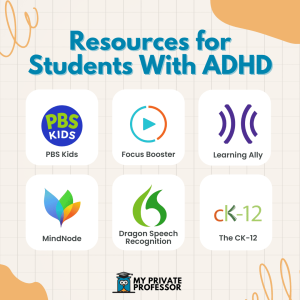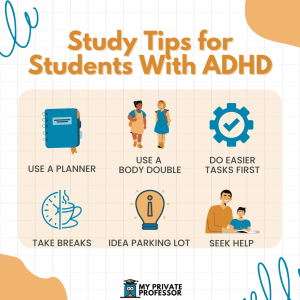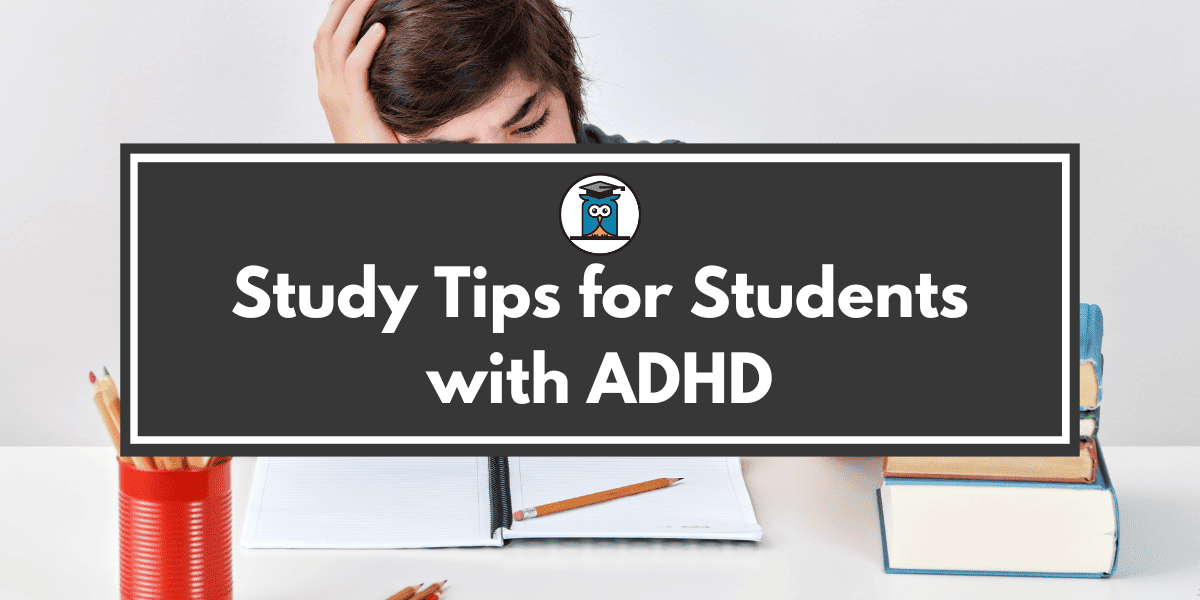By Taleen Shomar, MPP Tutor
For students with ADHD, studying can be a frustrating, all-consuming task. It often feels like you are fighting with your brain and wrangling your focus just to get started. This can cause students with ADHD to associate their schoolwork with negative emotions, which often leads to avoidance and procrastination.
While it’s important to work through these emotions to avoid procrastination, the issue will continue to persist unless you address underlying issues. Each ADHD brain has unique needs, and understanding your ADHD and what works for you is crucial to getting the most out of any study tip.
Especially when trying to study, understanding how the dopamine deficit in ADHD brains affects motivation and focus can explain why some study tips work and others don’t. 
Dopamine is a neurotransmitter in the brain that is released to trigger a rewarding feeling, typically after socializing, finishing chores, or accomplishing a goal. Some research has shown that ADHD may be related to low dopamine levels.
Low levels of dopamine in ADHD brains could be the cause of the reward-motivation deficit commonly observed in people with ADHD. Put simply, people with ADHD tend to struggle with motivation. And rewards (especially delayed rewards) are often less effective at motivating people with ADHD than their neurotypical peers.
Armed with this knowledge, you know that study tips that rely heavily on the reward aspect or require a great deal of motivation to start might not work well for your brain. Instead, look for tips that help boost and maintain motivation and contain small, but frequent rewards.
That being said, here are six study tips for students with ADHD.
1. Have a planner of some kind
How many times have you forgotten to do a homework assignment before the deadline? Or forgotten that you even had a homework assignment until the teacher starts collecting the assignment (or maybe you didn’t even realize there was an assignment until you see a zero in the grade book…)?
One way to prevent this from happening is to keep an agenda or calendar to you your tasks and due dates. Not only can this help you stay on top of your work, but having an accessible place to dump your tasks and events can free up brain space for other tasks. Additionally, the satisfaction that comes with crossing something off your to-do list can spur motivation.
If the first planner method you use doesn’t work, try other styles! The bullet journal method, (originally designed for ADHD brains) can be an extraordinary tool for exploring planning styles and finding one that fits your personal needs. A traditional planner, on the other hand, is a lot more structured and easier to set up.
2. Body doubling
Motivation can be a huge struggle for people with ADHD. This is a common issue that stems from certain brain differences (like the dopamine deficit discussed above) of those with ADHD compared to their neurotypical peers (people who do not have ADHD, ASD, or other mental conditions). 
Having a body double (someone that works near you as you work) can be effective for helping people with ADHD gain motivation. You can do this by finding a study buddy, or simply by working in a coffee shop or library.
While body doubling can encourage focus for some people, it may be a source of distraction for others. Knowing if/when you’ll benefit from body doubling is crucial, so experiment to see what works for you.
3. Don’t “eat the frog first”
One common productivity tip is to “eat the frog first”, which comes from the Mark Twain quote, “If you have to eat a live frog, do it first thing in the morning and nothing worse will happen to you for the rest of the day.”
Essentially, this is saying that if you do your most unpleasant task first, everything else will feel easy in comparison.
This may work for neurotypical people. But feeling like they can’t do anything until they complete the hardest task can lead to procrastination and shame among students with ADHD. Because getting started can be hard for ADHD brains, starting with easier tasks to get the ball rolling is much more effective. And the motivation that comes from completing easier tasks can help you complete the harder task later.
4. Pomodoro method
As we’ve established, building and maintaining motivation can be particularly difficult for people with ADHD.
The pomodoro method, where you study for a set amount of time, take a break, and repeat, helps prevent burnout. During the study blocks, you use no social media, no phone (for non-study purposes), and eliminate other distractions. 
The most popular time block is to work for 25 minutes and then take a 5-minute break. However, other time blocks, (like working for 10 minutes with a two-minute break), can also be effective.
There are also apps, such as Forest, that can block websites and apps to help you manage your pomodoro time blocks. The key is to play around with this technique and see what works best for you!
5. Idea parking lot
Picture this: you’ve started your work and you’re able to focus. That is, until you think of this great idea for your English assignment. And you have to drop everything and start that now. After all, if you wait, you’ll forget your idea and who knows if you’ll ever remember it!
So you start working on the assignment, and it’s going great. Until you remember that you have to start a load of laundry. And you have to do it right now or else you’ll forget! But just before you load the washing machine, you think of a hilarious joke to send your friend. And on and on you go, bouncing between tasks, leaving them half completed before moving on to the next thing. Welcome: idea parking lot.
On a notepad, whiteboard, or in your notes app, jot down any tasks/ideas that arise while you’re working. When you finish the task you’re currently working on, review the idea parking lot you’ve created. This way, you stay focused on your current task without getting distracted or risking forgetting any ideas or other tasks.
6. Seek help!
Studying doesn’t need to be something you have to figure out on your own. There are so many resources out there—from YouTube video tutorials, to online tutoring, to simply asking your teacher for help, there’s no need to struggle alone. You can also seek accommodations at school to more effectively study in class.
There is a huge community of people who share your struggles and/or are willing to help you. Remembering that you’re not alone and that there are people who can help you is key to not falling into a spiral of shame and self-doubt. As such, seeking help is one of the best things you can do for yourself as a learner.







